This is a complete guide to networking for consulting.
In this new guide, you’ll learn:
- How networking can help you land a consulting job
- Six timeless networking strategies
- How to leverage events such as career fairs and conferences
- Who to contact and what to say in informational sessions
- And lots more
So, if you are an undergraduate, MBA student, or professional with dreams of joining the ranks of prestigious consulting firms like McKinsey, BCG, and Bain & Company, this guide is for you.
Besides, whether you’re just beginning your journey or looking to fine-tune your networking skills, we’ve got you covered.
Let’s get started.
Table of Contents
The benefits of networking for consulting
Networking in the consulting industry offers many advantages.
Whether you’re an aspiring consultant or a seasoned professional, understanding these benefits can motivate and guide your networking efforts.
Hence, let’s explore now the six benefits of consulting networking.
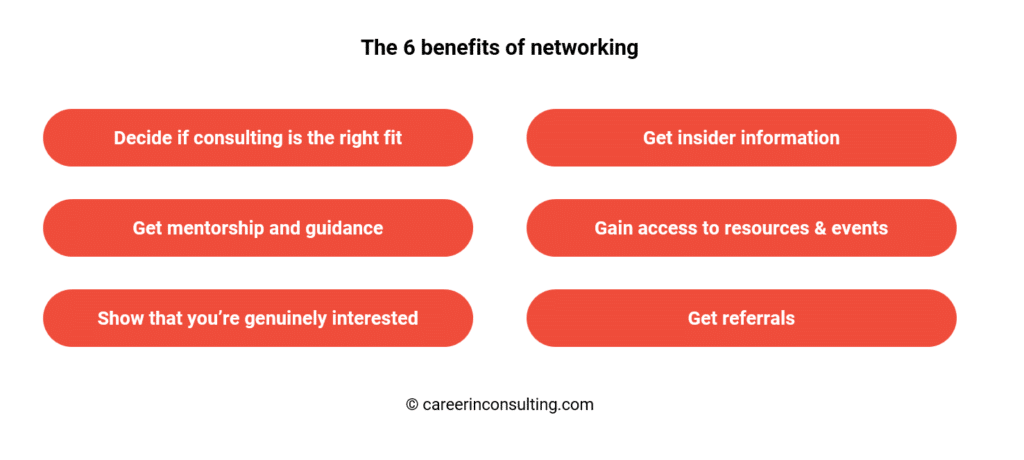
Decide if consulting is a good fit for you
Meeting and connecting with professionals from diverse backgrounds and experiences can broaden your perspectives and help you decide whether consulting (or a consulting firm in particular) is a good fit for you.
Get insider information
Management consulting firms operate in a highly competitive environment, and understanding their unique cultures, expectations, and recruitment processes can give you a competitive edge.
Networking lets you connect with consultants and HR professionals with firsthand knowledge of these management consulting firms.
Conversations with these insiders can provide you with invaluable insights into what firms are looking for in candidates, how to prepare for interviews, and how to align your skills with firm expectations.
Get mentorship and guidance
Connecting with experienced consultants can lead to mentorship opportunities.
Mentors can offer valuable guidance on career development, skill-building, and navigating the intricate landscape of consulting.
It’s an opportunity to learn from those who have walked the path before you and can provide invaluable guidance.
Gain access to resources and events
Networking often provides access to resources such as industry events, workshops, and training programs that can aid in skill development and preparation for consulting roles.
These resources can be pivotal in your professional development and preparation for consulting roles.
Attending workshops and training sessions hosted by consulting firms or industry organizations can help you develop the skills required in consulting, such as problem-solving, critical thinking, and effective communication.
Additionally, these events provide opportunities to interact with professionals and peers, fostering a collaborative environment where you can learn from others’ experiences.
Show that you are genuinely interested
Consulting firms receive tons of applications each year.
Hence, before giving a consulting offer to a candidate, a top consulting firm wants to be sure that this candidate will not leave within the first 6-12 months.
Why?
Top consulting firms invest a lot in their new consultants, for instance, in training or in mentorship from more senior consultants.
Therefore, imagine how awful it is when they extend an offer to the wrong candidates.
But, to avoid this situation, you must show that you are genuinely interested in joining this specific firm.
And one of the best ways to do it is to talk to as many consultants from this firm as possible.
Get referrals and recommendations
Building strong relationships with professionals in the industry can lead to referrals and recommendations, which carry significant weight in the competitive consulting recruitment process.
Referrals often result in a higher chance of being invited for interviews, as they endorse your qualifications and fit for the firm.
In other words:
A well-placed recommendation from a trusted contact can set you apart from other candidates and serve as a testament to your credibility and potential… and secure a consulting interview.
The law of reciprocity
When it comes to networking, understanding the law of reciprocity is essential.
This fundamental principle revolves around the idea that when you give, you receive in return.
Therefore, understand that the professionals you contact were once in your shoes—they were aspiring consultants who networked and sought guidance.
What does that mean for you?
Don’t fear bothering them.
Sending an email to someone can be intimidating.
But don’t be.
Most people you’ll contact are genuinely willing to assist others in their career journeys.
Some of them even want to go further and approach networking interactions with a mindset of mentorship.
And remember:
In a few years, it will be your turn to give back.
Six Timeless Effective Networking Strategies
Networking is more than just connecting on LinkedIn.
To excel in networking for a consulting career, here are six effective networking strategies.
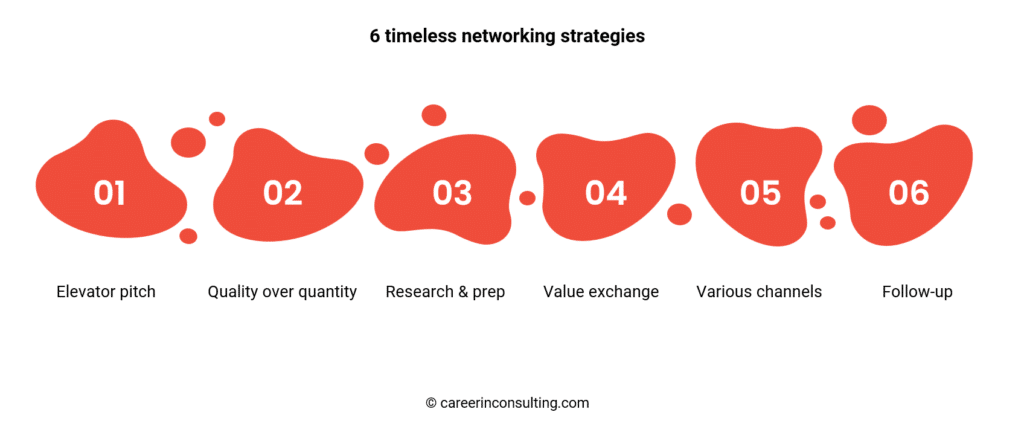
Networking Strategy 1: Craft a Compelling Elevator Pitch
First, develop a concise and engaging elevator pitch that succinctly introduces yourself, your expertise, and your career aspirations.
The goal? Make a memorable impression when you meet someone.
For instance:
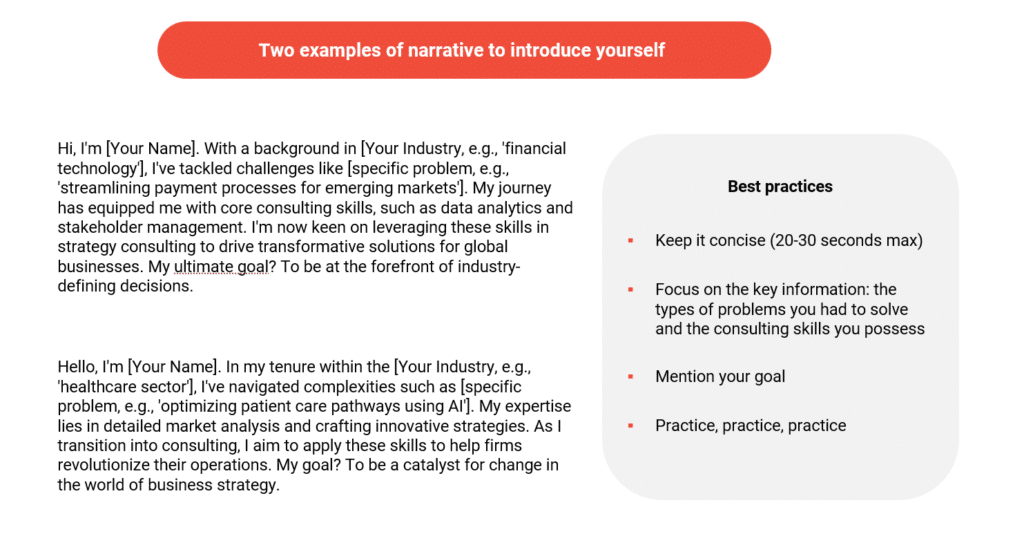
Keep it short: you have a limited time to introduce yourself.
Networking Strategy 2: Prioritize Quality Over Quantity
While it’s essential to expand your network, focus on quality connections rather than quantity.
Identify key individuals within consulting firms, such as consultants, partners, or HR professionals, and invest time in building meaningful relationships with them (more on that later in this guide).
A few strong connections can be more valuable than a large but superficial network.
Networking Strategy 3: Research and Preparation
Before networking events or meetings, research the individuals and firms you plan to connect with.
Understanding their backgrounds, recent projects, or company culture can help you engage in more meaningful conversations.
Plus, it shows your genuine interest and can lead to more productive interactions.
Finally, generic questions showing that you haven’t done your homework are very harmful.
Networking Strategy 4: Mutual Value Exchange
Networking for consulting should be a two-way street.
Seek opportunities to provide value to your connections, whether sharing industry insights or introducing others in your network.
Building a reputation as a valuable resource can enhance your networking efforts.
Networking Strategy 5: Diversify Your Networking Channels
Explore various networking channels, both online and offline.
Attend industry-specific events, conferences, and webinars to meet professionals in person.
Additionally, engage in online communities, forums, and social media platforms to expand your digital presence and connect with a broader audience.
Networking Strategy 6: Follow-up and Maintain Relationships
After initial interactions, don’t forget to follow up with your contacts.
Send personalized thank-you notes or emails expressing your appreciation for the conversation.
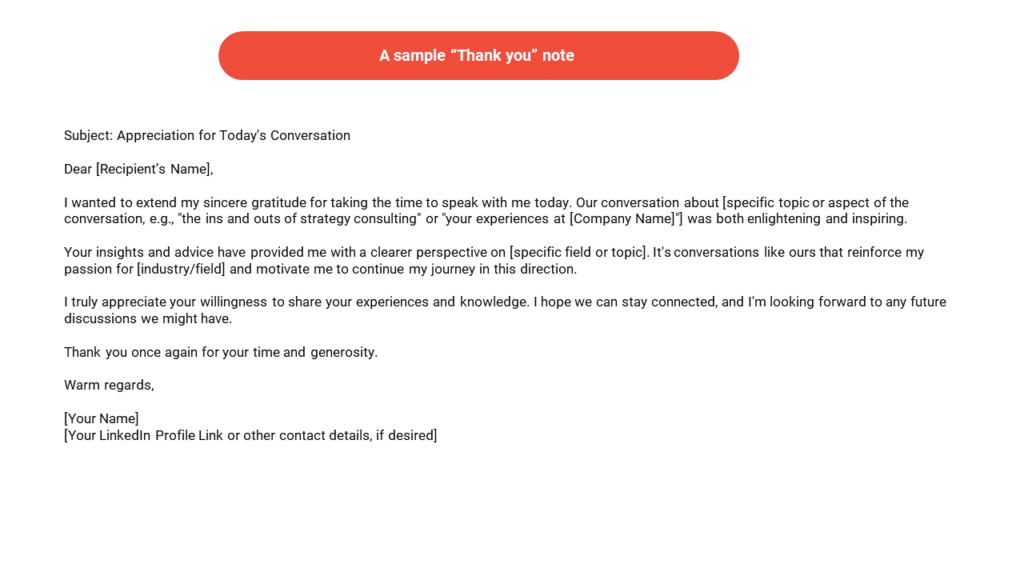
Regularly check in with your network to maintain and nurture relationships over time.
Plus, staying top of mind can lead to future opportunities.
Mastering the art of networking for consulting
Mastering the art of consulting networking requires a strategic approach that goes beyond casual socializing.
In this section, we’ll delve into key strategies to become a networking pro in the consulting industry.
Step 1: Building a strong networking foundation
First, it’s crucial to lay a solid networking foundation thoughtfully.
Clarify your primary goal
Take the time to clarify your primary goal: What do you aim to achieve through networking in the consulting industry?
Your goal could include:
Secure a referral
Gain insights into the industry or the company
Find a mentor willing to practice mock interviews with you
Having a clear purpose not only keeps you focused but also guides your networking efforts.
For instance, if your primary goal is to secure a referral, your networking strategy will revolve around making connections within your target consulting firms and building relationships with these folks.
On the other hand, if you seek industry insights, your networking approach may involve engaging in discussions with former consultants to gain a better understanding of the pros and cons of the job.
Do your homework
A key aspect of successful networking is demonstrating genuine interest and knowledge about the firms you’re targeting.
For instance, this involves spending time on a consulting firm’s website to delve into its unique attributes—be it its corporate culture, core values, signature projects, or the specific consulting services it provides.
By familiarizing yourself with these distinguishing factors, you not only showcase your commitment and preparation but also ensure that your networking conversations are meaningful and tailored to the specific firm’s identity.
Prepare your elevator pitch
This is a compelling narrative that showcases your unique strengths, skills, experiences, and values.
For instance:

Step 2: find the key people to contact
First, you can contact consultants working at your target firms.
You’ll find these consultants on LinkedIn and their emails using a tool like hunter.io.
Besides, networking events and conferences are prime opportunities to expand your circle within the consulting community. Here’s a list of the most common networking events you can join:
1. Alumni Mixers: Events where current students can meet with alumni from the business school to gain insights and advice.
2. Industry Panels: Sessions featuring professionals from various industries who share their experiences and knowledge.
3. Career Fairs: Multiple companies set up booths, allowing students to meet representatives, learn about job opportunities, and even have on-the-spot interviews.
4. Company Presentations: Specific companies come to campus to give a presentation about their operations, culture, and job opportunities.
5. Networking Dinners or Drinks: Casual dinners set up for students, alumni, and professionals to mingle and converse.
6. Workshops: Often focused on specific skills, like resume writing or interview techniques, and attended by industry professionals.
7. Study Trips: Visits to companies or other institutions, often in other cities or countries.
8. Conferences: Larger events that might span multiple days, featuring multiple industry speakers.
9. Case Competitions: While primarily academic events, these often have industry sponsors and offer networking opportunities with company representatives.
10. Guest Lectures: Invited professionals to speak on specific topics during regular classes or special sessions.
11. Mentorship Programs: Connecting students with industry mentors for guidance and advice.
12. Group Projects: Especially when sponsored by real companies, these can serve as networking opportunities.
13. Summer/Winter Intensives: Short courses during breaks that may bring in professionals as students or guest lecturers.
14. Soft Skill Training: Sessions on communication, leadership, or negotiation that may be led by or attended by professionals.
Step 3: Select the right people to contact
Consultants, partners, and HR professionals are often excellent choices:
Consultants can offer insights into the day-to-day life of a consultant, while partners may provide a broader industry perspective.
HR professionals can offer guidance on the recruitment process
The 4 criteria to consider when contacting people
Here is a list of criteria to consider before cold contacting consultants:
Position: consultant or staff member. The questions you’ll ask are not the same.
Grade: this is the person’s level (Consultant, Manager, Partner) in the firm. It can be more interesting to talk to consultants:
From the same level as you’ll join the firm (you’ll get insights about the day-to-day job)
At the Partner level (their referrals have a lot of value)
Geography: favor consultants from the same office you are targeting.
Tenure: the number of months and years this person works in the firm. The longer, the better.
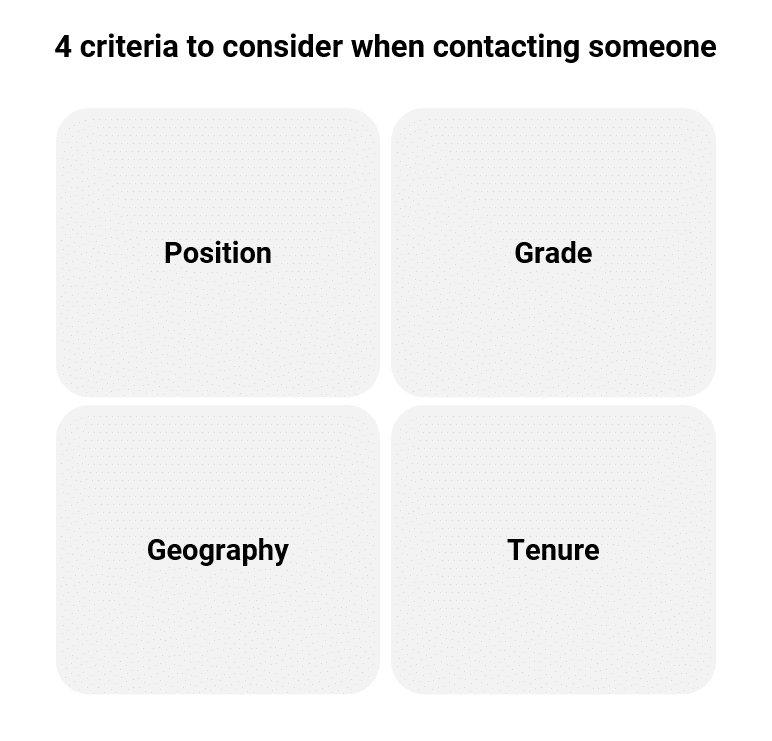
The circles of networking for consulting
Additionally, consider the circles of consulting networking.
These circles?
They represent the number of things you have in common with the people you contact.
In the hot circle?
You have a strong bond: maybe they are friends & family, or you have a very good friend in common.
In the next circle?
You still have much in common: same school, association, you worked for the same company in the past, etc.
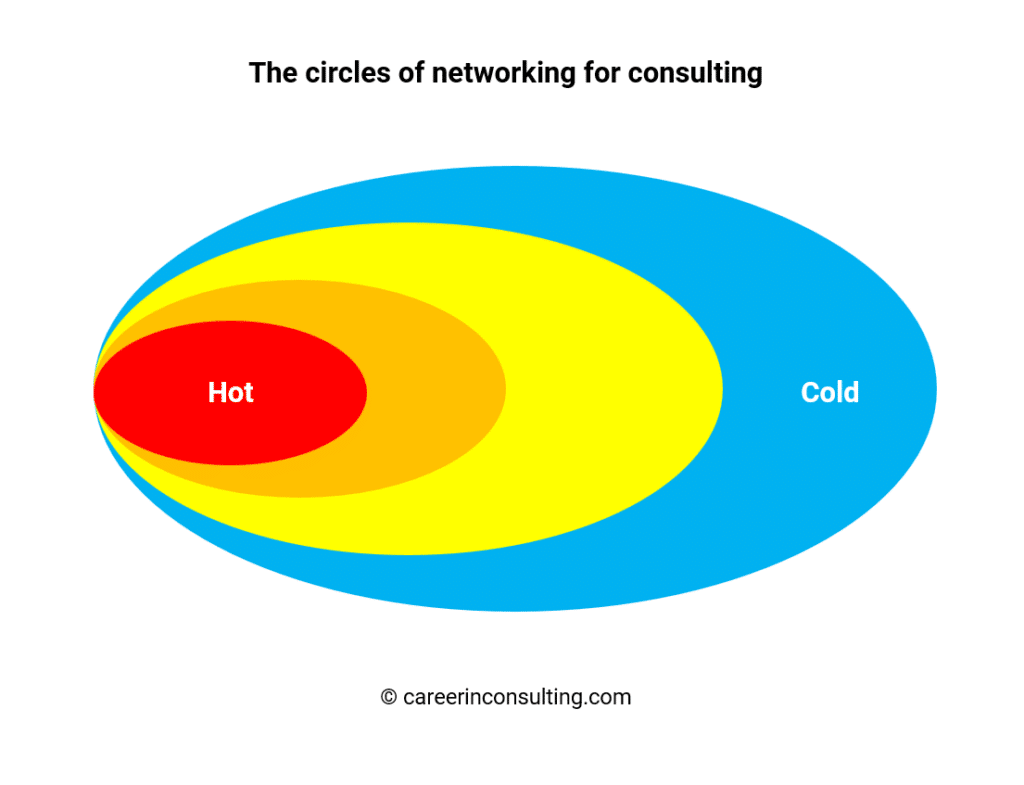
And in the last circle (cold)?
You have nothing in common except your desire to work for the same company.
This is why it’s called cold emailing 😉
Obviously, there are much more people in the cold circle than in the hot circle.
But the people in the cold circle will be less likely to respond to your connection request message.
Whereas the people in the hot circle will respond for sure.
Step 4: Contact consultants using these networking emails
The first rule when approaching someone is to make it easy to say “yes.”
Therefore, keep your introduction message concise and the call to action clear.
Besides, your message should include the following elements:
Who you are
Why you’re interested in speaking with them
What you are asking them to do (or agree on)
By doing so, you’ll show that you respect their time and express your genuine interest in learning from their experiences.
Here are three networking email examples.
First, a sample networking email to a consultant you’ve never met:
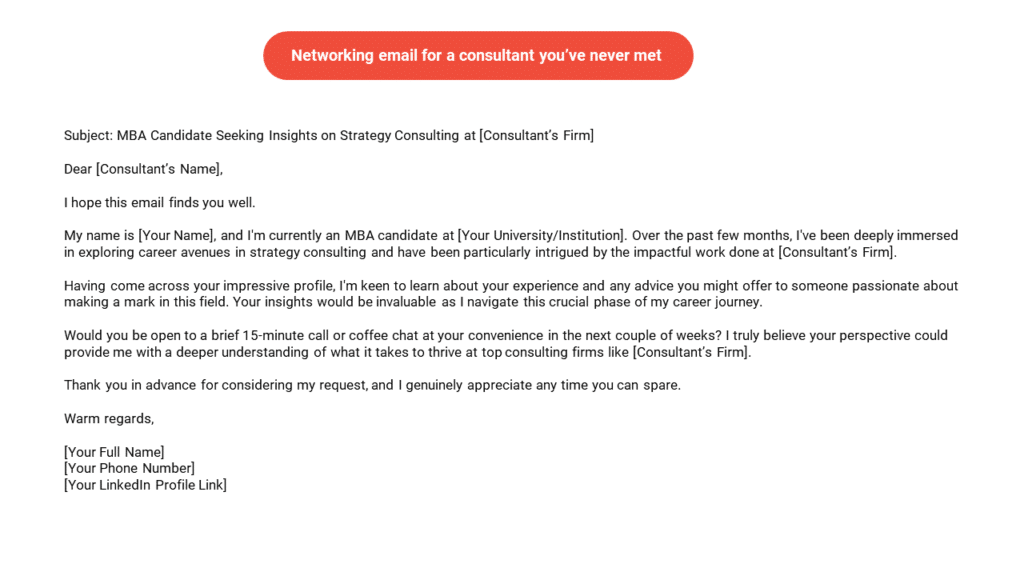
Secondly, a sample networking email to a consultant you’ve already met:
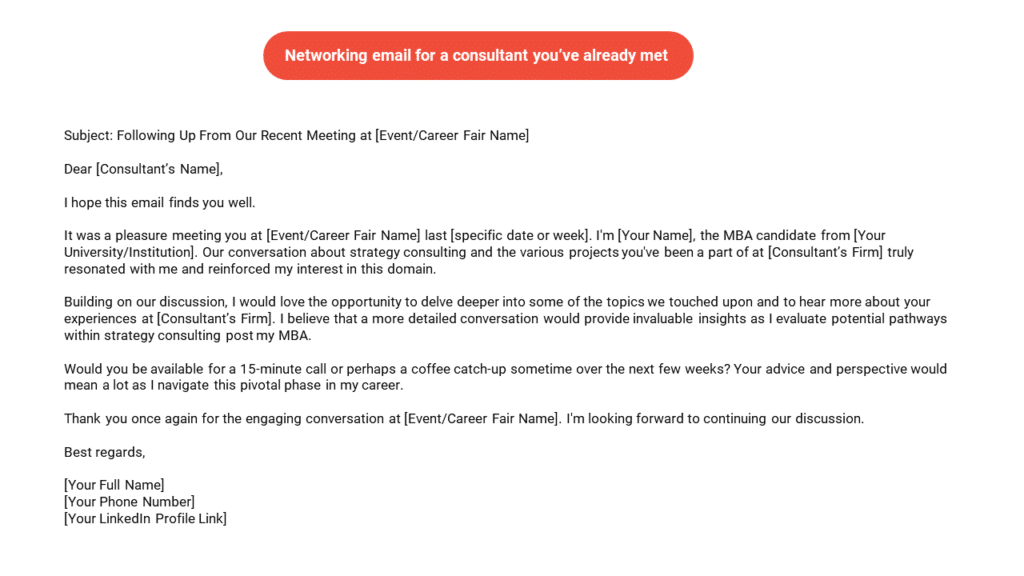
Third, a sample networking email to a consultant who’s been introduced through a friend:
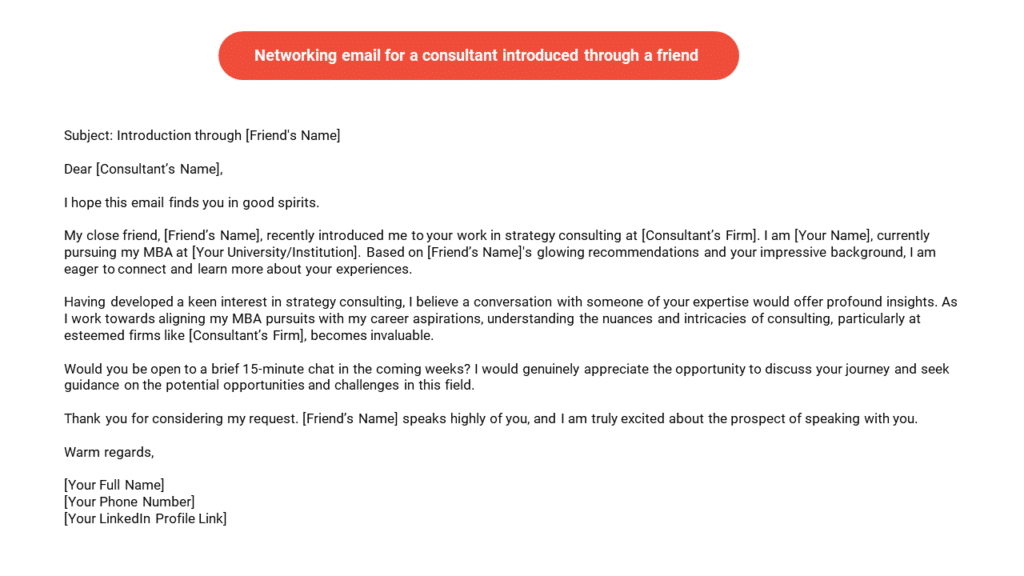
Get 4 Complete Case Interview Courses For Free

You need 4 skills to be successful in all case interviews: Case Structuring, Case Leadership, Case Analytics, and Communication. Join this free training and learn how to ace ANY case questions.
Step 5: Excel in informational discussions by asking these questions
Informational interviews involve one-on-one conversations with industry professionals to learn more about their careers, experiences, and advice.
They can give you a deeper understanding of consulting roles and help you make informed decisions about your career path.
The typical agenda of a networking call is the following:
Thank the person for his/her time
Introduce yourself (concisely)
Ask questions, listen carefully, and take notes
Thank the person again
Since we’ve already discussed how to introduce yourself before, let’s jump into the list of questions you can ask during a networking call:
Networking questions to ask about them:
Why have you decided to pursue a career in consulting?
After [X] years in consulting, have your motivations changed? If yes, why?
Why did you choose to join [firm’s name]?
What do you like the most and the least about your job?
What’s the most difficult aspect of your job?
What has been your favorite project so far?
Networking questions to ask about their firm:
How would you define the culture at [X]?
Can you give me an example of a situation that illustrates this culture?
How is performance evaluated?
What type of professional and personal skills does it take to succeed at [X]?
What other people do you recommend that I talk with? May I tell them that you referred me to them?
Networking questions to ask about the consulting sector:
What do you see as a major trend in the consulting sector today?
Networking questions to ask about you:
What do you think are the main challenges (for getting an offer) for people with my profile?
What would be your main advice for me?
What recommendations do you have for me regarding my job search strategy?
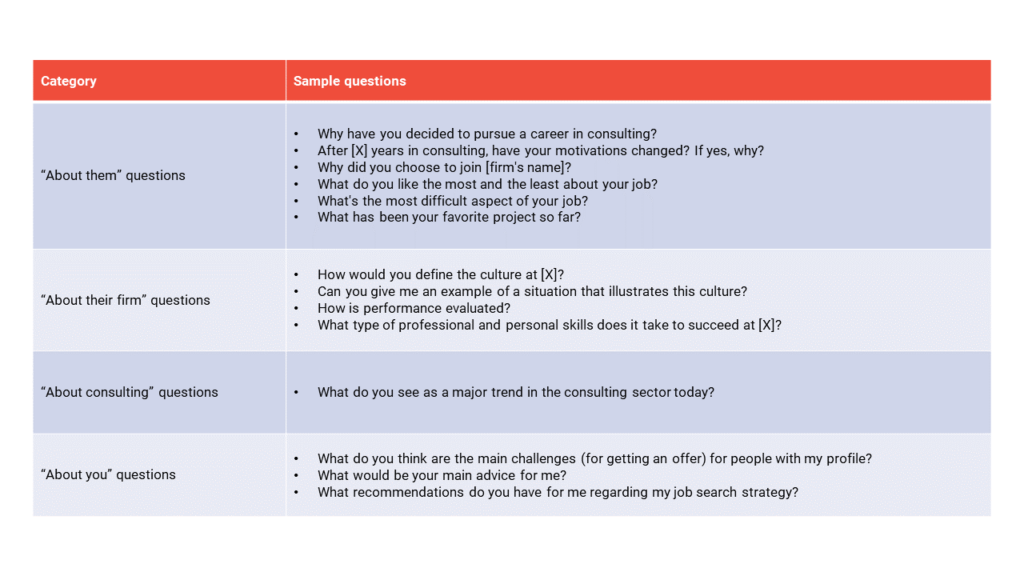
Besides, remember that customization is key.
Therefore, fine-tune the questions you will ask based on your research about the company and the person you talk to.
Plus, assume you’ll have time for only 3 or 4 questions.
Hence, choose these 3-4 questions carefully
Step 6: Send a thank-you note afterward
Finally, show appreciation for their insights and consider sending a thank-you note afterward.

Step 7: Nurture your management consulting network in the long term
Networking isn’t a one-off activity; it’s an ongoing process that requires consistent effort and maintenance.
Here are 3 strategies for nurturing your professional network over the long term:
Stay in touch with your network by periodically contacting and providing updates on your career progress.
Share relevant industry news, articles, or reports to showcase your knowledge and engagement.
Attend industry-specific events and conferences to maintain face-to-face connections.
Networking for consulting: frequently asked questions
How important is networking in hiring decisions?
This is important in the decision to invite a candidate for interviews.
Particularly if a candidate is not from a target school or has a “gap” (for instance, low GPA or GMAT), networking can make a big difference.
Why is networking important for consulting?
Top consulting firms are risk-averse.
This means:
If they have any doubt, top consulting firms won’t extend offers.
And networking is a good way to showcase your genuine interest in pursuing a career in that field.
Besides, the other advantages of networking include:
Decide if consulting or a firm is the right fit for you
Get insider information
Get mentorship and guidance
Gain access to resources and conferences
Get referrals
Besides, if you are an experienced hire, you don’t have access to the networking process and events organized by some business schools. Hence, this makes networking even more important.
When to start networking?
Short answer: as soon as possible.
Building your initial network is a critical step in your networking journey.
These initial connections often serve as the building blocks for expanding your professional circle within the consulting industry.
Here’s how to get started:
Leveraging Your Existing Contacts
An important rule in consulting networking is:
The more things you have in common with someone, the more likely this person will help you.
Therefore, when you begin networking, tap into your existing network of friends, family, classmates, and colleagues.
These individuals may have connections or insights that can be valuable in your consulting pursuits.
Hence, start by reaching out to them.
Joining Relevant Student or Professional Organizations
Consider becoming a member of student (or alumni) or professional organizations that are relevant to the consulting industry.
For instance, your school’s consulting club is probably a good place to start networking.
These groups often host events, workshops, and networking opportunities tailored to individuals interested in consulting.
Active participation in these organizations can help you connect with professionals from the top consulting firms of your dreams.
Does networking help at McKinsey?
Yes, like any other management consulting firm, networking helps.
Any tips for an effective LinkedIn profile?
Your LinkedIn profile often serves as the first point of contact with potential networking connections.
Ensure that your profile is complete, well-maintained, and professionally presented.
Like with your consulting resume, you must highlight your skills, experiences, and achievements in a way that resonates with consulting professionals.
Should I network with current employees or former consultants?
Short answer: both
With former consultants, you can have a transparent discussion about a firm’s culture.
In other words: there is no marketing BS, only the truth!
Besides, former consultants may have more time to give you mock case interviews.
On the other hand, networking with current employees can lead to referrals.
Networking with consulting firms: final words
Whether you’re a student or a seasoned professional, consulting networking is the bridge that connects you to the world of opportunities and excellence.
That’s why, in this comprehensive guide, we’ve explored the art of consulting networking, from understanding the benefits and building a strong foundation to mastering effective networking strategies and navigating the referral process.
So, start building your network today and open the doors to a consulting job.
Sébastien
Get 4 Complete Case Interview Courses For Free

You need 4 skills to be successful in all case interviews: Case Structuring, Case Leadership, Case Analytics, and Communication. Join this free training and learn how to ace ANY case questions.
